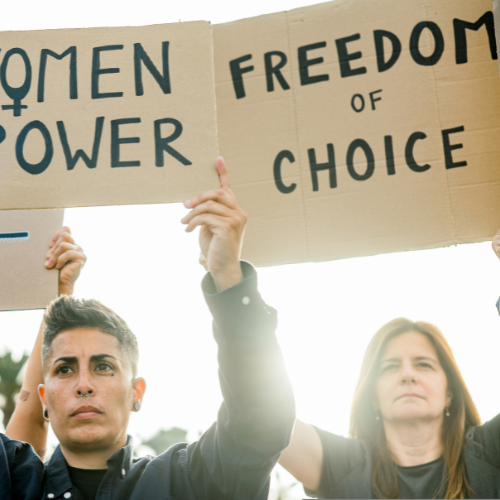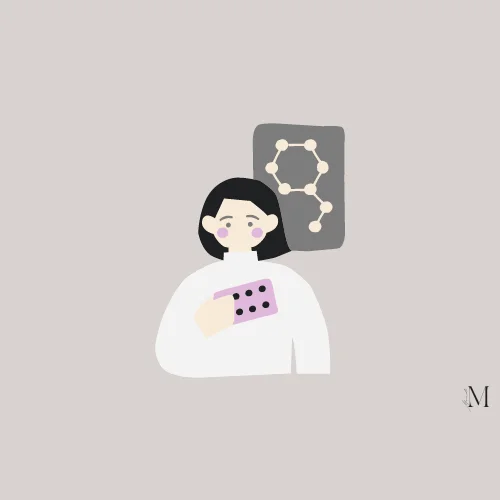Hello Cool-Girls ! Following challenging events worldwide these last months for women, a new movement started to rise on Tiktok among feminists content creators. It is called “decentering men”. This american movement takes its roots with the 4B movement that was created in South Korea in response to the oppression and violence of a patriarcal system deeply ingrained there. The 4B movement follows 4 principles that starts with the korean word bi” (비), meaning “no”: no dating, no marriage, no sex, no children.
1. The roots of the ” Decentering men ” movement
The movement of “decentering men” has intensified following the victory of the Republican presidential candidate in the 2024 US election. His win amplified women’s fears, particularly regarding the future of reproductive rights. Indeed, following the overturning of Roe v. Wade on June 24, 2022, by a 6-3 conservative majority, 12 states have completely banned abortion.

Since Trump’s election, American women have feared that this ban will be extended to all states and that other reproductive rights will be threatened, such as the right to contraception, the right to coerced sterilization, the right to access to reproductive care and the right and access to neutral information about reproductive choices.
This movement is no longer merely activism; it has become a crucial measure of self-preservation, essential for women’s safety. Indeed according a 2024 study from the Gender Equity Policy Institute published by NBC news, “From 2019 to 2022, the rate of maternal mortality cases in Texas rose by 56%, compared with just 11% nationwide during the same time period”.
2. What really means ” Decentering Men “
a. What people think “decentering men” means
The “Decentering men” movement, much like the 4B movement, is strongly criticized by the conservative wing of the United States because it seeks to challenge the traditional social, economic, and cultural model. It is perceived as a threat to the privileges of those who benefit from this system.
Some also see this movement as an attempt to shift power
Because of the name of this movement, ‘Decentering Men,’ some perceive it as a personal attack against ‘men’ rather than a pursuit of equality.
Some also see this movement as an attempt to shift power, decentering men to center women. This would result in a reversal of inequalities, with the oppression faced by women being redirected. Men would, in turn, find themselves excluded from society. This fear demonstrates that they are well aware of the oppression women endure, as they project onto this movement a potential inversion of women’s condition at the expense of men’s.
b. What it is
Let them be mistaken, this movement clearly demonstrates opposition to patriarchy and its products. But it does not seek to remove men from our worlds ! It is about refusing to participate in a world that marginalizes us and center men’s needs. The world we no longer want is one created exclusively for the interests of men, at the expense of women.

While women in many countries today have the same rights as men, they are still burdened with unequal ‘duties.’ These obligations, deeply ingrained in the psyche of both women and men after centuries of patriarchal conditioning, oppress women globally. A web of societal expectations reinforces the patriarchy, systematically blocking women’s access to equal rights and opportunities.
Example of Critiques that Center Men’s Needs
- You’re selfish for not wanting children.
- You don’t want to get married? You’ll change your mind later.
- You let your husband take care of the kids?
- You’re too picky!
- A man doesn’t want a woman with a high “body count”.
- Men prefer women who don’t wear makeup.
- You’re too smart, it intimidates men.
Such criticisms are frequently expressed when a woman chooses to put herself first. When you think about it, these critiques often serve as a manipulative tactic, aiming to guilt-trip her into centering her decisions and life around men, rather than prioritizing her own needs and aspirations.
To decenter men is to recognize one’s own desires and refocus on oneself.
These expectations don’t exist for men, and as long as they persist for women, true equality will remain out of reach.
3. How to Take back your power ?
Decentering men is a philosophy that unfolds in two stages:
- Awakening: Recognizing the ways patriarchy shapes our lives.
- Liberation: Freeing ourselves from its constraints to reclaim our freewill.
A. Awakening
Awakening is the stage of dismantling the gender norms ingrained in us by patriarchal society, norms we’ve unconsciously absorbed. These aren’t the overt norms that the fight for women’s rights largely eradicated in the last century, such as the belief that women must submit to their husbands, avoid working, or belong in the kitchen. Instead, we’re talking about subtler, more insidious norms that deepen gender inequalities and sustain the systemic oppression of women.

Fairy tales about princesses and princes instill these subtle yet harmful norms in children from a young age. A common thread runs through these stories: they revolve around men, positioning them as the focal point of the princesses’ lives. This narrative often sidelines the importance of practicing self-love and building a sense of self-worth independent of romantic relationships. Among these narratives, several damaging illusions emerge.
Harmful Narratives Imposed on Young Girls
- That a charming prince will save them.
- That women must accept violence in the name of love.
- That women must sacrifice themselves for love.
- That they must be chosen rather than being able to choose.
- That a persistent man is a deserving man.
- That her beauty is her greatest asset.
- That her suffering is noble and inevitable.
- That her ultimate goal is to marry and have many children.
These enchanting stories profoundly shape children’s understanding of love, serving as their first exposure to romantic ideals. The problem is that these aren’t just innocent fairy tales, they are illusions that movies, books, art, and everyday social interactions perpetuate and reinforce well into adulthood.
This isn’t about dismissing these works but rather acknowledging them for what they are: products of their time, reflecting ideas that no longer fit the world we’re building.
b. Liberation
How many of us wasted years seeking validation from men? How often have we stayed in toxic relationships in the name of love? How many abandoned their dreams for the sake of love? Can you now see the profound damage caused by a world that revolves around men?

If you’re already awake, you’ve probably realized: the time has come. It’s time to complete what our grandmothers began, not by asking nicely, but by taking back our power. Our power is the ability to shape our lives as we see fit and to reject any life that doesn’t align with our truth.
How to Take Back your Power ?
- Put yourself at the center of your life.
- Let go of internal guilt for prioritizing yourself.
- Understand that no one is coming to save you.
- Never accept violence or any kind of abuse in the name of love.
- Never sacrifice your dreams for a man.
- You are the master of your life.
- Putting your needs first is an act of self-love.
- Never lower your standards due to social pressure.
- Not all men deserve your attention.
- Strength lies in the ability to say no to suffering.
- Your worth is not measured by your appearance, but by the strength of your mind.
- Your ultimate goal is the one you choose.





